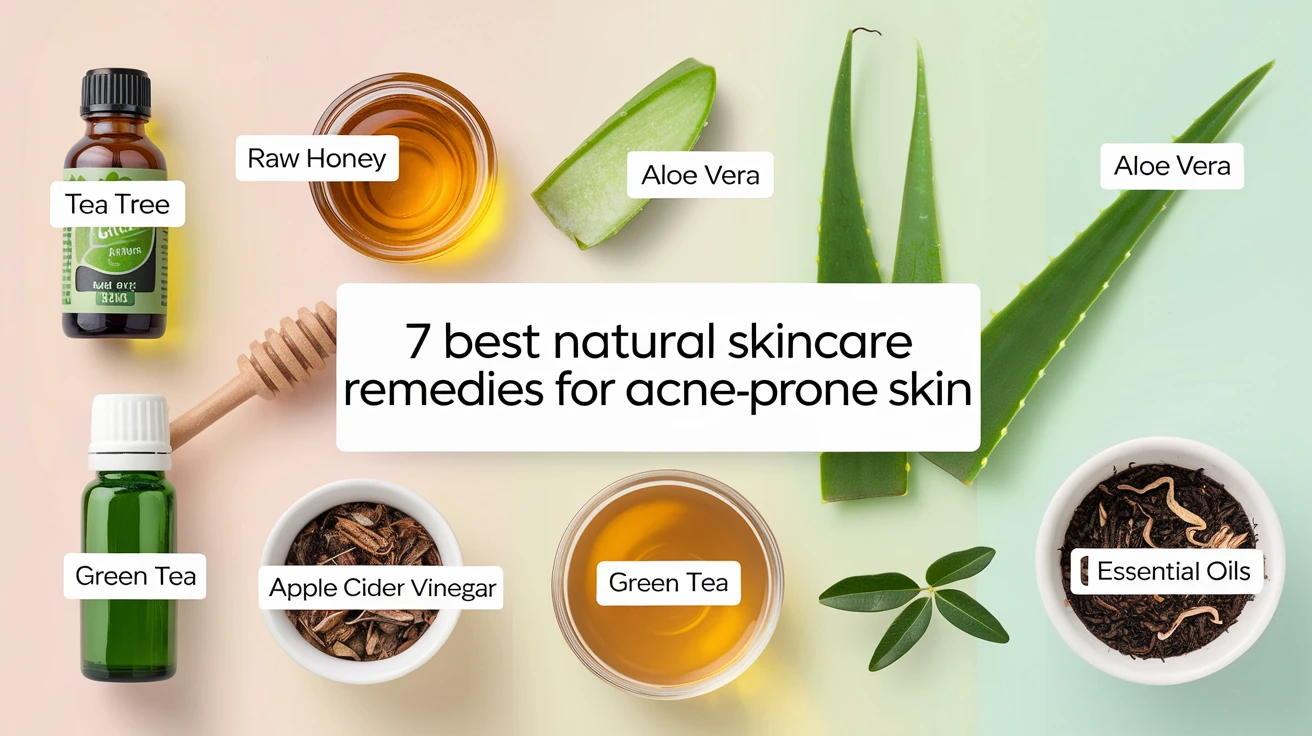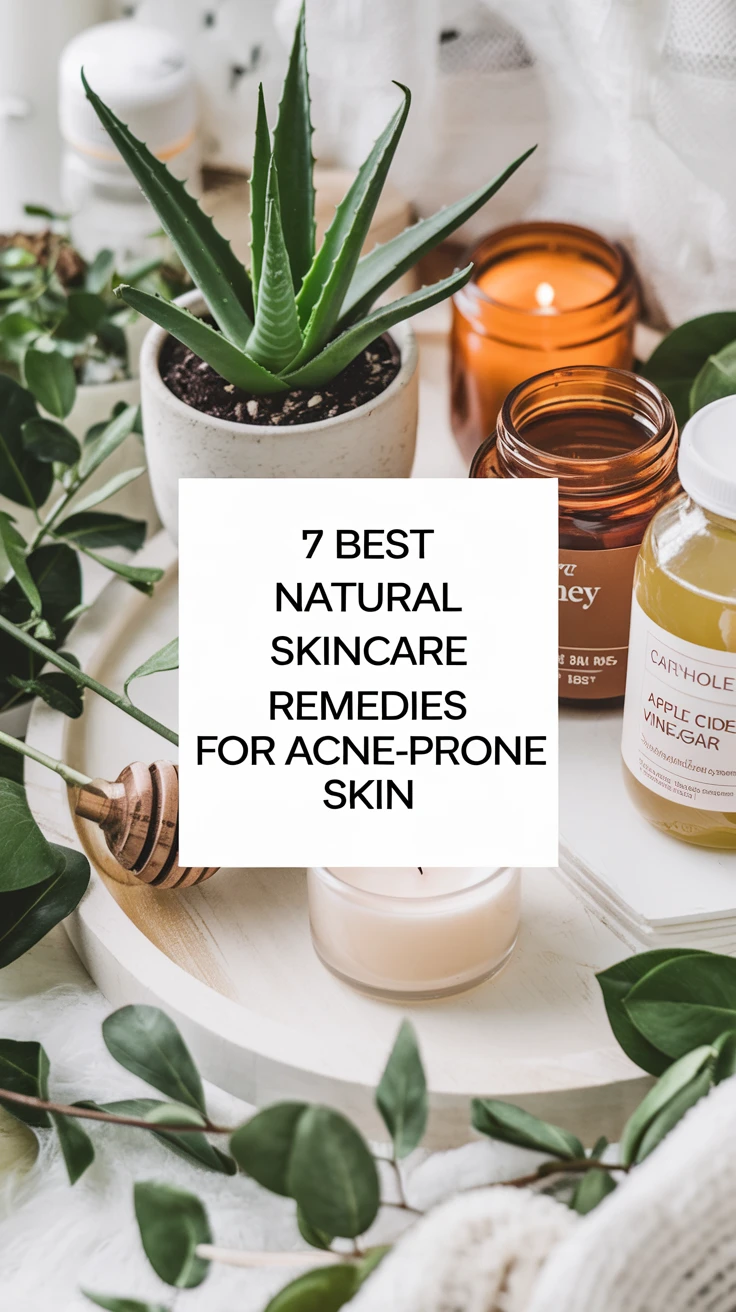
Struggling with acne can feel like an endless battle, especially when conventional treatments leave your skin feeling dry, irritated, and sometimes even worse than before. I’ve been there – trying every harsh chemical solution on the market, only to find that Mother Nature had the answers all along. Natural skincare remedies for acne-prone skin not only treat existing breakouts but also help prevent future ones while nourishing your skin in the process. After years of experimentation and research, I’ve compiled the seven most effective natural remedies that have transformed not only my skin but also the complexions of countless others who’ve made the switch to natural skincare.
1. The Tea Tree Oil Revolution: Nature’s Antiseptic
Tea tree oil has been my go-to solution for spot treatments, and there’s solid science behind its effectiveness. This powerful natural antiseptic contains compounds that fight acne-causing bacteria while reducing inflammation. However, I learned the hard way that using it correctly is crucial.
Proper Application Methods
- Always dilute with a carrier oil (1:10 ratio)
- Apply only to affected areas using a clean cotton swab
- Use once or twice daily after cleansing
- Store in a dark glass bottle away from sunlight
| Carrier Oil Options | Mixing Ratio | Best For |
|---|---|---|
| Jojoba Oil | 1:12 | Oily Skin |
| Argan Oil | 1:10 | Combination Skin |
| Hemp Seed Oil | 1:8 | Dry, Acne-Prone Skin |
2. Sweet Success with Raw Honey: A Natural Humectant
When I first heard about using honey for acne, I was skeptical. But raw honey has become an essential part of my skincare routine. Its natural antibacterial properties and ability to retain moisture make it an ideal treatment for acne-prone skin.
Benefits of Raw Honey
| Property | Benefit | Application Method |
|---|---|---|
| Antibacterial | Kills acne-causing bacteria | 10-minute mask |
| Humectant | Maintains skin moisture | Spot treatment |
| Anti-inflammatory | Reduces redness | Overnight application |
Pro tip: Look for raw, unprocessed honey, as processed varieties lack the beneficial enzymes and compounds that make this remedy effective.
3. The Healing Power of Aloe Vera: Beyond Sunburn Relief
Aloe vera has been my skin’s best friend during severe breakouts. This succulent plant contains compounds that reduce inflammation, promote healing, and help prevent scarring. I keep an aloe plant on my windowsill for fresh gel, but pure aloe vera gel from stores works well too.
Application Methods
- Fresh gel directly from the plant
- Mixed with tea tree oil for enhanced effects
- Combined with honey for an overnight mask
- Used as a natural moisturizer
4. Apple Cider Vinegar: Nature’s Toner
Apple cider vinegar (ACV) transformed my skincare routine by balancing my skin’s pH levels. However, it took some trial and error to find the right dilution. The key is starting with a highly diluted solution and gradually increasing the concentration as your skin adjusts.
Dilution Guide
| Skin Type | Water:ACV Ratio | Usage Frequency |
|---|---|---|
| Sensitive | 4:1 | 2-3x weekly |
| Normal | 3:1 | Daily |
| Oily | 2:1 | 2x daily |
5. Green Tea: More Than Just a Beverage
Green tea’s antioxidant properties make it a powerful ally in the fight against acne. I’ve found that both drinking green tea and applying it topically has made a significant difference in my skin’s clarity and overall health.
Application Methods
- Cool tea bags as spot treatments
- Brewed tea as a facial mist
- Green tea-infused oil for moisturizing
- Mixed with honey for a face mask
6. Neem: Ancient Wisdom for Modern Skin
Neem has been used in traditional medicine for centuries, and for good reason. Its powerful antibacterial and anti-inflammatory properties make it especially effective for treating stubborn acne. I discovered this gem while researching Ayurvedic remedies, and it’s become a staple in my routine.
Ways to Use Neem
| Form | Application | Frequency |
|---|---|---|
| Oil | Spot treatment | Nightly |
| Powder | Face mask | Weekly |
| Leaves | Tea rinse | 2-3x weekly |
7. Essential Oil Blends for Clear Skin
Creating customized essential oil blends has allowed me to target multiple skin concerns simultaneously. The key is understanding which oils work best together and maintaining proper dilution ratios.
Recommended Combinations
- Lavender + Tea Tree for inflammation
- Frankincense + Geranium for scarring
- Rosemary + Clary Sage for oil control
- Chamomile + Helichrysum for sensitivity
Conclusion
Natural skincare remedies offer a gentle yet effective approach to managing acne-prone skin. Through my journey, I’ve learned that patience and consistency are key – these solutions may take longer to show results compared to harsh chemicals, but the long-term benefits for your skin’s health are worth the wait. Remember to patch test new remedies and listen to your skin’s needs, as what works for one person may not work for another.
Key Takeaways
- Always dilute potent ingredients like tea tree oil and apple cider vinegar
- Consistency is crucial for seeing results with natural remedies
- Combine different remedies for enhanced benefits
- Listen to your skin and adjust treatments accordingly
- Quality matters – use pure, organic ingredients when possible
Frequently Asked Questions
How long does it take to see results with natural acne remedies?
Most people start seeing improvements within 2-4 weeks of consistent use. However, everyone’s skin is different, and some may notice changes sooner or later.
Can I combine multiple natural remedies?
Yes, you can combine remedies, but introduce them one at a time to identify what works best for your skin and avoid potential reactions.
Are natural remedies safe for sensitive skin?
While natural remedies are generally gentler than chemical alternatives, always patch test new ingredients and start with lower concentrations, especially if you have sensitive skin.
What’s the best time to apply these remedies?
Most treatments work best when applied to clean skin before bed, allowing them to work overnight. However, some can be used morning and night, depending on your skin’s tolerance.
Can I use these remedies while using prescription acne medication?
Consult with your dermatologist before combining natural remedies with prescription medications, as some combinations might reduce effectiveness or cause irritation.
How should I store natural skincare ingredients?
Most natural ingredients should be stored in cool, dark places in airtight containers. Some may require refrigeration, especially if they’re preservative-free.
Can diet affect the effectiveness of these remedies?
Yes, a healthy diet complements topical treatments. Focus on anti-inflammatory foods and stay hydrated for best results.
What’s the best way to prevent scarring while using natural remedies?
Avoid picking at blemishes, use sun protection, and incorporate ingredients like aloe vera and honey that promote healing and reduce inflammation.
How often should I apply these remedies?
Frequency varies by remedy and skin sensitivity. Start with once daily applications and adjust based on your skin’s response.
Can pregnant women use these natural remedies?
While most natural remedies are safe during pregnancy, always consult with your healthcare provider, as some essential oils and herbs should be avoided during pregnancy.


